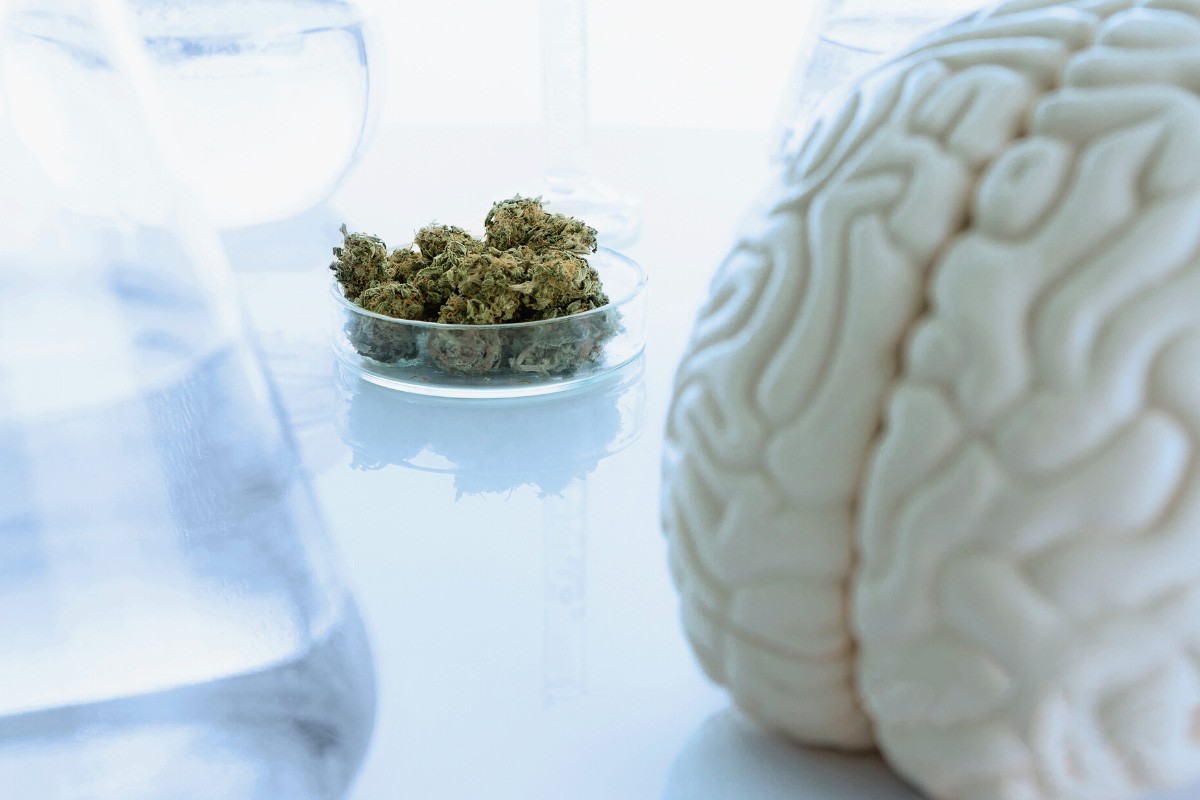Medical cannabis can be used for a variety of neurological and psychiatric conditions. In a recent review, the neurologist and psychiatrist Prof. Dr. Kirsten Müller-Vahl from the Hannover Medical School reviewed the current literature on the topic of medical cannabis in Tourette syndrome and evaluated the study results (1).
The author also addressed the question of the underlying mechanism behind the symptom relief of medical cannabis in Tourette’s syndrome. In several analyzed studies the patients had undergone neuropsychological tests, whereby in each case no adverse effect on reaction time, concentration or also memory performance could be determined. Prof. Müller-Vahl thus assumes that the positive effects of medical cannabis do not result from a general reduction in activity or sedation but are rather based on specific effects of cannabinoids on certain regions of the brain. Particularly relevant could be an effect via the cannabinoid receptor (CB) 1, which is located in high density in Tourette-associated brain areas, as well as a complex interaction with the dopaminergic system, which also plays a relevant role in the pathophysiology of the disease. According to the author, treatment of Tourette syndrome with medical cannabis might be started, for instance, with a low THC dose of 2.5 to 5 mg/day and gradually titrated up to a dose of 10-20 mg/day THC, depending on efficacy and tolerability. Administration should be divided into two to three doses per day. There is also preliminary evidence that administration of a combination preparation of tetrahydrocannabinol (THC) and cannabidiol (CBD), such as Sativex®, shows similar results with respect to tic disorders as pure THC, with a better side effect profile to be expected. Overall, the author concludes, the body of evidence supports the use of medical cannabis for treatment-resistant Tourette’s syndrome in adults, although the limitations of the available studies must also be considered. Often these would only have a small sample size, a rather short treatment duration, as well as possible selection bias. For this reason, further large-scale randomized-controlled trials are still needed.
The clinical picture of Tourette’s syndrome
Tourette syndrome, precisely Gilles-de-la-Tourette syndrome, is frequently associated with the sudden use of various swear words in public, which often leads to irritation. In reality, this symptom, known as coprolalia, occurs only rather rarely. If it does, however, it is very characteristic for the disease. Tourette’s syndrome is a disorder associated with multiple vocal and motor tics. These are often very complex and may – but do not have to – also appear simultaneously. Typical are involuntary muscle twitches in the face and extremities, as well as vocal tics such as sudden throat clearing, smacking or barking. Many patients experience a premonitory urge before the actual tics occur. Due to the social exclusion caused by the uncommon and often perceived as rude behavior in public, it often results in considerable suffering for the patients. It is known from observational studies that the disorder often exacerbates in adolescence and persists into adulthood. Tourette’s syndrome predominantly affects the male gender and is regularly associated with psychiatric comorbidities such as ADHD or Asperger’s autism. The medical cause of the tic disorder appears to be an excess of dopamine in a specific brain region, the basal ganglia, which is why drug therapy approaches are aimed at interfering with dopamine metabolism. As part of a multimodal therapeutic approach, this is supplemented with psychoeducation, psychotherapy and educational support. The prognosis is usually not too favorable, as the disease often becomes chronic in the absence of a response to therapy.Study results on the effect of medical cannabis on Tourette’s syndrome
In her review of the literature, Prof. Müller-Vahl reports on individual case studies as well as on two randomized controlled trials that investigated the effect of medical cannabis on Tourette’s syndrome. In these it was consistently shown that medical cannabis had a positive effect on the tic disorders often associated with Tourette’s syndrome. Furthermore, it was shown with a lower level of evidence that the use of cannabinoids could also reduce other symptoms such as impulsivity, shortened attention span, and obsessive-compulsive behavior. As an example, the author cites a randomized and placebo-controlled trial among 12 adult patients with Tourette’s syndrome who were prescribed either medical cannabis or a placebo. Using a self-rating scale (TSSL), the study found a significant global reduction in tics after THC compared to placebo. Moreover, the improvement in motor tics increased with the dose level of the THC drug. Relief of other common symptoms of Tourette syndrome, such as obsessive-compulsive behavior, was also significantly demonstrated in corresponding tests. While 10 of 12 patients in the THC group reported an overall improvement, only 3 of 12 in the placebo group did so. Moreover, no serious adverse effects occurred.The author also addressed the question of the underlying mechanism behind the symptom relief of medical cannabis in Tourette’s syndrome. In several analyzed studies the patients had undergone neuropsychological tests, whereby in each case no adverse effect on reaction time, concentration or also memory performance could be determined. Prof. Müller-Vahl thus assumes that the positive effects of medical cannabis do not result from a general reduction in activity or sedation but are rather based on specific effects of cannabinoids on certain regions of the brain. Particularly relevant could be an effect via the cannabinoid receptor (CB) 1, which is located in high density in Tourette-associated brain areas, as well as a complex interaction with the dopaminergic system, which also plays a relevant role in the pathophysiology of the disease. According to the author, treatment of Tourette syndrome with medical cannabis might be started, for instance, with a low THC dose of 2.5 to 5 mg/day and gradually titrated up to a dose of 10-20 mg/day THC, depending on efficacy and tolerability. Administration should be divided into two to three doses per day. There is also preliminary evidence that administration of a combination preparation of tetrahydrocannabinol (THC) and cannabidiol (CBD), such as Sativex®, shows similar results with respect to tic disorders as pure THC, with a better side effect profile to be expected. Overall, the author concludes, the body of evidence supports the use of medical cannabis for treatment-resistant Tourette’s syndrome in adults, although the limitations of the available studies must also be considered. Often these would only have a small sample size, a rather short treatment duration, as well as possible selection bias. For this reason, further large-scale randomized-controlled trials are still needed.
Summary
This text addressed the effectivity of medical cannabis in Tourette’s syndrome. According to a recent review, the body of evidence shows positive effects on associated tic disorders. In addition, there is evidence that cannabinoids may also improve other associated symptoms such as obsessive-compulsive behavior or impulsivity. The cannabis preparations were generally well tolerated. Therefore, and according to the German Society for Neurology guidelines, a therapy with THC should be considered in treatment-resistant adult Tourette’s patients.








